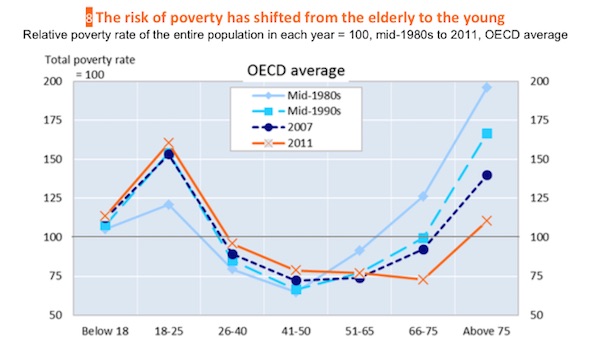Mitchell, B. (2015) “While Europe debates a placebo the disaster deepens“, Bill Mitchell Blog: Modern Monetary Theory… Macroeconomic Reality, 12 January.
The youth are our future. The future is for our youth. Poverty used to be a problem of the aged as they left employment and entered retirement. Shorter life spans than now meant it was a relatively short-lived but deplorable state for people to end in. All that has changed. The youth are still our future but there is a much diminished future for them. Poverty risks and burdens have also shifted from the older members of the population to the younger members. From the retired to the jobless and casualised worker. And we get angry when young people get lured away by what they see as attractive, hope-filled futures, that may or may involve remaining alive in the here and now, and wield guns and bombs. Yet the policies we support close the door on any future that might be more acceptable to the rest of us. Neo-liberalism is creating a ticking bomb. The GFC was just the first act. Societies around the advanced world are undermining their own longevity as they accept that fiscal austerity is the only alternative. To what?
Last June, the OECD released a report – Income Inequality Update – which provided recent data on trends in income distributions and the demographic impacts of rising inequality.
The results are well known now although the implications of the trends exposed are less appreciated.
The OECD found that:
- “The distribution of ‘market income’ (gross earnings and capital income) kept widening even as many countries recovered from the crisis.”
- The largest rises in inequality “occurred in those countries hit hardest by the crisis: Spain, Ireland, Greece, Estonia and Iceland but also in France and Slovenia. In Spain and Greece, inequality of market income widened considerably in the aftermath of the crisis, and kept increasing more recently as the crisis persisted”.
- “Lower income households either lost more during the crisis or benefited less from the recovery.”
- “In Greece … poverty increased by almost 15 percentage points over the four years to 2011, with large increases (between 9 and 3 points) also experienced in Ireland, Spain, Iceland, Hungary and Mexico.”
- “Over the four years since the onset of the crisis, young people (aged 18 to 25) suffered the most severe income losses, while elderly people (over 65) were largely shielded from the worse effects of the crisis.”
The OECD use the so-called relative income poverty measure, which is “the share of individuals with an equivalised disposable income below 50% of the national median”.
Relevant posts:
- Schmid, G. (2014) “Inclusive Growth: What Future for the European Social Model?“, IZA Policy Paper No. 82, May 2014.
- Galbraith, J. K., The End of Normal: The Great Crisis and the Future of Growth, Simon and Shuster, New York: September 2014.
- Veugelers, R. (2014) “Is Europe saving away its future? European public funding for research in the era of fiscal consolidation“, VoxEU Organisation, 28 August.




